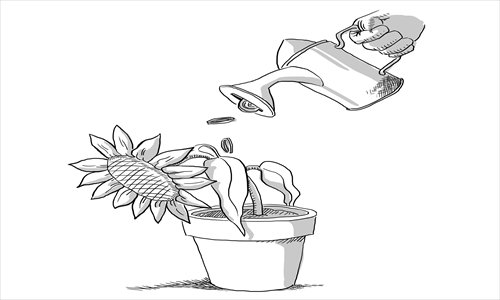China’s aid to Africa needs transparency

China's foreign aid expenditure has been soaring with Africa chosen as the main recipient.
A new roadmap defining Chinese aid shows that the continent will receive $20 billion over the coming three years, about double what it has received in the past three years.
The aid puts emphasis on infrastructure with more than $15 billion being spent on 900 roads and energy projects in Africa.
The development is seen as an extension of China's belief in reciprocity and mutual benefit, integrating deeper economic benefits and political interest. This is a shift in focus from the "we give you what we want" model, as Beijing's approach has been described in the past.
While it may be difficult to tell with absolute confidence if China's aid to the continent is a competitor or alternative to the Western aid program, it is clear that the aid is bringing social, political and economic change to Africa. Its roads are up to global standards, and multi-billion dollar hydropower, solar and biogas projects are being constructed in more than 11 countries.
Beijing feels indebted to Africa's push as a continent to support China's foreign policy. African states did indeed form a diplomatic offensive to help Beijing regain its seat at the UN in 1971.
Unlike Western aid, China's aid doesn't come with conditions. This has provided a possible avenue of developing economic and political autonomy for Africa.
The rationale is that projects avoid avenues for possible corruption and generally produce quick and tangible results. Crucially, the aid is seen as much more streamlined, speedy in reaching its target and less complicated.
However, the approach has led to criticism that it is fuelling poor governance in the continent. Zimbabwe, Angola, Ethiopia and Sudan are some of the nations that continue to receive Chinese aid even with their deteriorating political fabric.
Opponents have also brought to the fore the issue of the ineffectiveness of the aid, which they allege is not bettering Africa's well-being.
China has, however, vehemently defended its non-interference policy. It claims that it evokes historical ties between China and Africa and also arouses a shared sense of injustice at the hands of the West.
China's special representative to Darfur, Liu Guijin, recently argued that China will never attach any kind of political conditions to these aid and development projects, as the provision of assistance is for the benefit of the people, not for political purposes or for showing off to the outside world.
The criticisms ignore the longer-term implication of Chinese aid to Africa. They conspicuously fail to appreciate the landmark developments achieved so far in the continent funded by the aid programs. In addition, opponents have uncritically assumed Western aid to be morally better and more effective in terms of outcomes.
What seems to be fading fast from memory is that even the Western nations' aid effectiveness in the continent sometimes collapsed. The structural adjustment programs of the 1980s and 1990s went bust due to their inflexibility.
Worse is the fact that the aid conditionality failed to stimulate growth, especially in nations that had just emerged from political quagmires, like Zimbabwe.
But this does not absolve China from massive condemnations of its foreign aid to the continent. As a matter of fact, Chinese aid lacks transparency. This makes it hard to tell what is and what is not considered aid.
Ultimately, this has been left to the mercy of some corrupt politicians, who at times end up using the resources for their personal gains.
In addition, China does not use the same categories of aid or Overseas Development Assistance as Western nations do. This makes it difficult to differentiate between economic cooperation and investment.
For this financial support to be more effective in the continent, it is critical that China review its aid policies, so that they are in tandem with the global trend.
It will be more helpful if Beijing came up with a document, such as the 2005 Paris Declaration on Aid Effectiveness formulated by Organization for Economic Cooperation and Development (OECD) countries, to properly coordinate and boost aid efficiency.
This will see the aid money move away from the porous projects-based approach to direct budget support and poverty reduction plans.
More importantly, it will be beneficial if China and the US harmonized their aid programs in Africa, since they seem to have a common goal.
The author is a journalist on African issues based in Nairobi, Kenya. mkapchanga@gmail.com